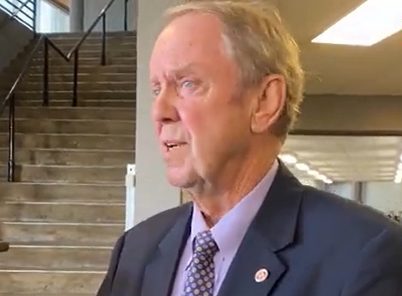
Mississippi lawmakers consider move to state-based health insurance exchange

Mississippi State Finance Committee Chairman Josh Harkins, R-Flowood, in the Senate chamber at the Mississippi State Capitol in Jackson, Mississippi, Thursday, Jan. 25, 2024. (AP Photo/Rogelio V. Solis)
- If a full state-based exchange is implemented over the next two years, the Mississippi Department of Insurance estimates it could save the state more than $100 million in the first five years.
Efforts to create a state-based health insurance exchange will remain under consideration by Mississippi lawmakers after the Senate approved legislation on Wednesday.
House Ways and Means Chairman Trey Lamar (R) presented the idea to lawmakers this year to create a state-based exchange for health insurance.
HB 1647 Mississippi would be moved away from the federal exchange established through the Affordable Care Act and create a state exchange with the goal of saving the state additional dollars on an annual basis. Currently, Mississippi pays a 3 percent rate for the federal exchange, which amounts to about $15 million annually.
The state exchange will be operated by the State of Mississippi and rates will be developed by an independent actuarial firm that is set by a regulatory board.
At the beginning of the 2024 session, as the bill passed in the House, Representative Lamar said he believed the state exchange would give individuals better options.
“Health insurance is really expensive,” Lamar said. “We are looking at ways to help Mississippians working within our current legal environment gain better and more access to health care.”
Senate Finance Committee Chairman Josh Harkins (R) offered a strike-all amendment, which was adopted by the Senate after a hearing Wednesday morning with the Department of Insurance (MDI).
Senator Harkins told members he was keeping the bill alive to continue examining the option of a state-based exchange.
According to MDIThere are three types of market exchanges, a fully state-based, a divided state and federal, and a fully federal market. MDI officials said the main difference between a full state exchange and an exchange that still operates on the federal platform is that it is completely controlled by the state.
Insurance Commissioner Mike Cheney (R) previously said the change would significantly benefit individuals on the exchange between 100 and 138 percent of the federal poverty level (FPL). The insurance department will have to plan for the state exchange.


If lawmakers move forward with the plan, enabling the exchange would begin in July 2024 when the bill becomes law. However, Commissioner Chaney said it was unlikely the exchange would be implemented until at least 2025.
For the first year, Mississippi will follow in the footsteps of Georgia and Arkansas with a hybrid state-federal exchange model (SBE-FP). Cheney estimates that fees collected for that first year will be approximately $56-$59 million. However, as an SBE-FP the state will retain only about 18 percent of those fees in the first year.
Recent data indicate that approximately 285,000 Mississippians participate in the federal exchange, which was implemented with the Affordable Care Act in 2014. For Mississippians, Magnolia Health and AmBetter in the Molina Marketplace are available for health insurance coverage.
Of those 285,000, about 280,000 receive the Advanced Premium Tax Credit (APTC) for their plans and more than 200,000 get the Cost Sharing Reduction (CSR), meaning 98 percent of individuals in the market receive a subsidy for their plan. Are getting. Open enrollment for 2024 added more than 80,000 Mississippians to the marketplace.
For the first two years of the state-based exchange, the federal government will still provide some assistance. After that, the exchange will be completely state-based using a federal platform. Currently, 19 states operate their own exchanges separate from the federal platform, three of which are in a hybrid set up.
With a state-based exchange, customers will select their coverage, including where they can qualify for the tax credit. The insurer enrolls them and sends a bill to the federal government for the user fee. The state exchange then evaluates the carrier to pay for state-based operations, and the state retains the user fee. The federal government then reimburses insurance carriers in full for the premium tax credit.
If a state exchange is implemented, the state will reinvest the assessment fee and use it to help run the exchange, along with any savings, while a portion of the user fees can be reinvested in the program. .
Overall, MDI estimates that the state could save between $137-$196 million over five years by switching to a state-based exchange with estimated annual operating costs of $18-$27 million.
Commissioner Cheney told lawmakers that her office supports providing a healthy exchange for Mississippians in lieu of federal efforts to move subsidized people off the exchange and onto Medicaid.
“The bottom line, that's why the feds want to try to get people off the market and onto Medicaid, so they can give them free money. We are against it, I will tell you up front so you know where I stand on this,” Chaney said. “I think it's bad policy to give something for free to people who are paying for insurance.”
The Legislature continues to consider a plan aimed at expanding Medicaid. The original House bill has been replaced with Senate language that would allow expansion of the FPL to 100 percent only subject to work requirement waiver approval from CMS. Both the Houses are expected to meet on this issue in the coming days.





